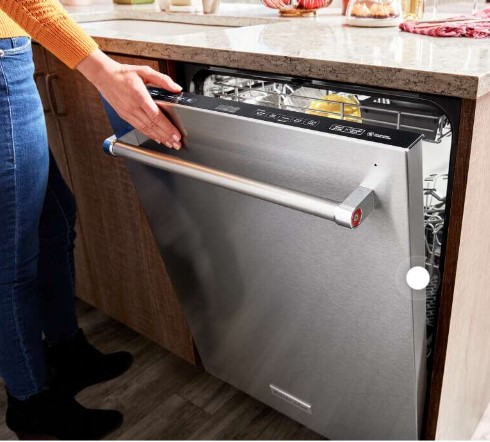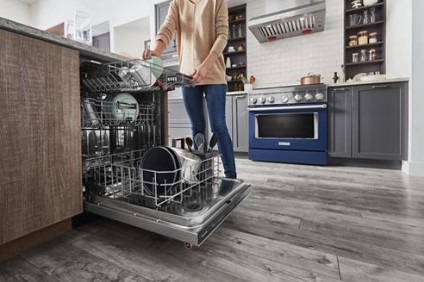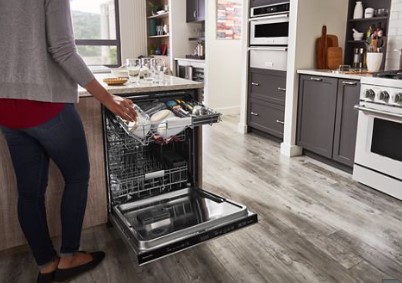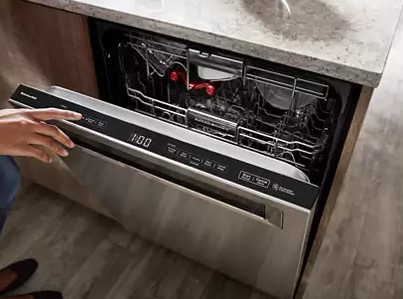Ideally, you expect the dishwasher to beep when the dishwashing cycle ends to indicate that the dishes are thoroughly clean. But what if it’s not an end-of-cycle beep and you can’t stop but ask, ‘why is my KitchenAid dishwasher beeping?’
Your KitchenAid dishwasher is beeping because of an unlatched door, dish overload, wrong setting, inadequate detergent or Rinse Aid, reduced water level, clogged filter, a power fault, or faulty reed sensors.
Although you expect the dishwasher to beep when the dishwashing cycle ends, not all beeps point to that – Others point to a fault you can fix if you know how.
As I’ll explain, you can troubleshoot the dishwasher yourself, and you don’t have to pay a dishwasher expert to do it for you. Let’s jump in!

In a hurry? Below is a troubleshooting guide for your beeping KitchenAid dishwasher
Quick Troubleshooting Guide for A Beeping KitchenAid Dishwasher
| – | Likely Cause | Fix |
| 1. | Unlatched Door | Latch the open door, and don’t open it until the end of the cycle. If the door latch is cracked, replace it |
| 2. | Dish Overload | Remove all the dishes and rearrange them without overloading |
| 3. | Incorrect Setting (Control Lock, Sleep Mode, or Delayed Wash) | Deactivate Control Lock, Sleep Mode, or Delayed Wash if any of them is active, or reset the dishwasher |
| 4. | Inadequate Detergent | Add more detergent and restart the dishwasher |
| 5. | Inadequate Rinse Aid | Refill the Rinse Aid and restart the dishwasher |
| 6. | Reduced Water Level | Turn on the water supply valve, unblock the water supply line, and change a faulty inlet valve or stuck float switch |
| 7. | Clogged Filter | Remove and clean the clogged filter |
| 8. | Power Fault | Reset and restart the dishwasher |
| 9. | Defective Reed Sensors | Replace worn-out reed sensors if they are worn out |
Why Is My KitchenAid Dishwasher Beeping?
Your KitchenAid dishwasher beeps to communicate something. It could be a fault or a regular operation (like in our first case). You, however, have to differentiate between a normal beep and an abnormal beep.
Let’s discuss the two types:
Normal KitchenAid Dishwasher Beeping Sound
KitchenAid Dishwasher Beeping Clean – The ‘End of Cycle’ Beeping
It’s normal for a KitchenAid dishwasher to beep at the end of the cycle. The dishwasher beeps clean to show that the dishes are thoroughly cleaned.
Note, however, that sometimes the dishwasher may beep clean before the dishes are done. That could point to an issue like low water level or excessive soap, which should be fixed.
Fix
Check the dishwasher to determine if it’s an End-of-Cycle beep. If it is, remove the dishes. However, if the dishwasher beeps clean before the end of the cycle, ensure its water supply is well connected if the water is not enough. And if there are excessive suds, reduce the amount of soap.
Abnormal KitchenAid Dishwasher Beeping Sound
Now, if your dishwasher is not beeping clean (which should be a normal beep, as shared above, the beeping could indicate a fault. Generally, a KitchenAid dishwasher beeps for the following reasons:
1. Unlatched Door (KitchenAid Dishwasher Beeping Every 30 Seconds)
It’s pretty unusual for a dishwasher to beep every 30 seconds. A KitchenAid dishwasher will, however, do that when it detects an unlatched door.
It could be that you forgot to return the door or just opened it mid-cycle and interrupted the cleaning cycle. If that’s not it, it could be that the door latch is broken and will not lock it.
Fix
Try to latch the dishwasher door firmly, and if it locks, don’t interrupt the cycle. Meanwhile, inspect the door latch for damage and replace it if it looks broken.

2. Dish Overload
Your KitchenAid dishwasher will tell you when you load it with many dishes. It does so by beeping. Remember, the dishwasher needs room for the spray arm to turn and thoroughly spray water over the dishes.
So, if there are many dishes, they’ll end up blocking the spray arm, and consequently, the dishwasher fails to run and produces a beeping sound.
Fix
Consider removing the dishes from the dishwasher racks and rearranging them appropriately but don’t overload them this time. Ensure the dishes obstruct the spray arms.
3. Incorrect Setting (KitchenAid Dishwasher Beeps But Won’t Start)
If your KitchenAid dishwasher starts beeping as soon as you load the dishes and doesn’t start, it’s most likely due to using the wrong setting. That includes any of these:
- Control Lock – Control Lock is a safety feature on KitchenAid dishwashers that stops the dishwasher from running. Its goal is to bar kids from operating the dishwasher, and you can tell if this feature is on if the control panel lights up and beeps.
- Sleep Mode – The Sleep Mode is an energy-saving mode on a KitchenAid dishwasher that also forces the dishwasher to make a beeping sound.
- Delayed Wash – The Delayed Wash or Delayed Start postpones the starting time until you firmly add items into the dishwasher and latch the door. If selected, Delayed Wash will cause the dishwasher to make a beeping sound.
Fix
You should deactivate any of the above settings if they are active.
Deactivate Control Lock by pressing the control lock button for at least 3 seconds. Choose either Cancel/Drain or Start/Resume to deactivate the sleep mode and hold down the Cancel/Drain button to disable Delayed Wash.
And if you cannot do it, consider resetting the dishwasher by plugging it out of the power for 5 – 10 minutes.
4. Inadequate Detergent
A KitchenAid dishwasher can also make a beeping sound if the amount of soap in the soap dispenser is not enough.
Fix
This is pretty straightforward – top up the dishwashing soap and restart the dishwasher.
5. Inadequate Rinse Aid
The Rinse Aid, a surfactant, lowers the dishwashing water surface tension to avoid water spots and promote a thorough wash. Once the level drops, the dishwasher won’t clean as usual and may even stop running, producing a beeping sound.
Fix
Inspect the Rinse Aid compartment and refill the surfactant if its level has dropped. Then restart the dishwasher and pick a new cycle.
6. Reduced Water Level (KitchenAid Dishwasher Beeps Three Times)
Your dishwasher uses water to clean the dishes. The dishwasher will beep three times if the water drops beneath a certain level. Overall, the reduced water level could be because of any of these reasons:
- Leakage due to a faulty water inlet valve or float switch
- Kinked water supply level
- Turned-off water supply valve
Fix
Start by ensuring the water supply valve is turned on. Unkink the water supply line and use a multimeter to determine if the water inlet valve is faulty.
Replace it if it lacks continuity. Additionally, replace a stuck float switch

7. Clogged Filter
A KitchenAid dishwasher also beeps when the filter becomes too dirty to do its job. But to avoid that, it’s advisable to inspect the filer routinely.
Fix
Inspect the dishwasher filter for clogging and clean it if that’s the case.
8. Power Fault
Following a power surge or outage, a KitchenAid dishwasher may beep continuously. In most cases, the dishwasher needs a restart.
Fix
Consider rebooting the dishwasher by unplugging it for 5 – 10 minutes and restarting it.
9. Defective Reed Sensors
Lastly, your KitchenAid dishwasher may beep continuously because of a faulty reed sensor. The work of the reed/sensor is to detect obstructed spray arms. They, however, start to malfunction when they start wearing down.
Fix
Inspect the reed sensors for wear and replace them if that’s the case.
Other KitchenAid Dishwasher Beeping-Related Problems
KitchenAid Dishwasher Beeping and Flashing
Your KitchenAid dishwasher will beep and flash or blink to indicate any of these issues:
- Unlatched door – It could be that you didn’t latch the door properly or just opened it while the cycle was underway.
- Delay Start – The Delay Start setting could be on, thus delaying the dishwasher from starting immediately.
- Water leakage – The water could leak due to a leaky water supply valve, anti-flood device, or stuck float.
- Power interruption – There could have been a recent power outage.
KitchenAid Dishwasher Beeps 15 Times
A KitchenAid dishwasher beeps 15 times when there’s an error code. You can tell the identity of the KitchenAid dishwasher beep codes by pressing three consecutive buttons in a 3-cycle pattern, for example, 1,2,3,1,2,3,1,2,3.
Fix
Reset your dishwasher to eliminate the error code and stop the beeping. Here’s how to perform the KitchenAid dishwasher Reset Sequence:
- Press High-Temp Wash + Heated-Dry on your dishwasher
- Repeat the above sequence three times to make it a 4-cycle sequence
- Press High-Temp Wash another time to reset the Control Board
- Wait for the control panel indicators to turn on and press Cancel/Drain
- Run the dishwashers hot water down the kitchen sink briefly and then choose a new cycle
- Press Start to complete the reset

People Also Ask
1. Why Does My KitchenAid Dishwasher Beep?
Your KitchenAid might be beeping because it’s the end of the cleaning cycle. If not, it could be due to an open door, power failure, low rinse aid, detergent or water level, a clogged filter, or dish overload.
If that’s not it, it could be an active Child Lock, Sleep Mode, or Delayed Wash setting.
2. Why Does My KitchenAid Dishwasher Keep Beeping Clean?
Your KitchenAid dishwasher beeps clean because it’s the end of the wash cycle. In such a case, you need to get the dishes out.
Sometimes, however, the dishes may beep clean before the end of the cleaning cycle. If so, that points to an issue like a low water level or too much soap.
3. How Do I Stop My KitchenAid Dishwasher from Beeping?
You can stop your KitchenAid dishwasher from beeping by selecting the silent mode or resetting the appliance. Sometimes, however, the dishwasher may continue beeping, so you can only stop it by addressing the underlying cause.
It could be an unlatched door, low rinse aid, detergent or water levels, a clogged filter, or a power fault.
In summary, why is my KitchenAid dishwasher beeping?
As shared, your KitchenAid dishwasher may be beeping because its wash cycle has just ended; that’s normal. However, other issues may cause it to beep, thus worth checking and fixing. That includes an unlatched door, dish overload, wrong cycle setting, low detergent, Rinse Aid or water level, clogged filter, power fault, or worn-out reed sensors.
Also Read:
